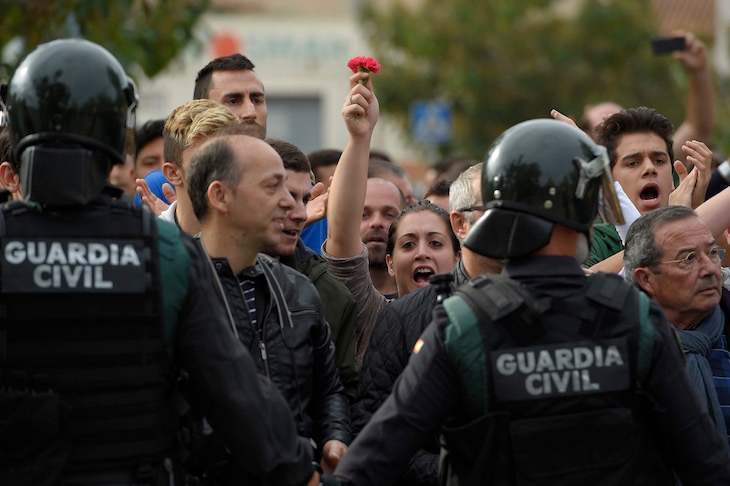In Barcelona civilians have been giving red carnations to policemen (a symbolic echo of the 1974 revolution in Portugal) but here in Extremadura today’s Catalan Independence vote has been greeted with a mixture of sadness and dismay. In the historic city of Caceres, balconies are festooned with Spanish flags – part of a nationwide demonstration of national unity (local newspapers are reporting that more Spanish flags have been sold here in the last few days than when Spain won the World Cup).
In stark contrast to prosperous Catalonia, Extremadura has always been one of the poorest parts of Spain. A parched wilderness of scrub and stunted oaks and gnarled old olive trees, it’s renowned for its olive oil and Iberian ham (its black pigs love the acorns) but these ancient industries generate few jobs. A remote, landlocked region beside the Portuguese border, unemployment has always been high here and many of its young people have always had to move away in search of work.
It was ever thus. You can see why this harsh landscape spawned so many of the conquistadors. More recently, Catalonia has been the biggest magnet for Extremaduran youth. As the Catalan economy has boomed, Extremadura has remained an obscure backwater – a delight for independent travellers searching for the unspoilt Spain, but not much use for anyone else.
Rich Catalans resent the constant drain of taxes from their homeland to Extremadura; Extremadurans resent the constant drain of manpower from their homeland to Catalonia. Today’s independence vote has exacerbated these resentments – and talking to people in Caceres it’s quite clear that popular feeling is behind the national government in Madrid, which has declared this referendum illegal. Locals liken Catalonia to a selfish relative who’s struck it rich and now wants to abandon his old family.
These old resentments run deep. From the 1950s to the 1970s Franco built numerous new factories in Catalonia, and poor Extremadurans flocked there to find work. Many of them stayed. Industrious Catalonians may be weary of propping up sleepy Extremadura but Extremadurans argue that modern Catalonia was built with Extremaduran muscle.
‘We all depend on each other,’ says Miguel, 43, who was born here in Caceres, and has family in Catalonia. ‘We all have the same problems [but] the Nationalist government in Catalonia have always put the blame on Madrid. Nationalist politicians in Catalonia have taken advantage of the economic crisis to create the idea that all their problems will be solved by independence. They’ve been using education to indoctrinate people. In the last 30 years they’ve created a huge mass of opinion that the attitude of the central government towards Catalonia has always been bad.’
Extremadurans like Miguel believe that threats of secession have given Catalonia extra clout in its dealings with Madrid, attracting state investment that’s denied to poorer, patriotic regions like Extremadura. ‘The European Union has brought a lot of good things to the region,’ he says, but although the EU has built new roads, other infrastructure still lags far behind Catalonia. ‘We have the worst trains in Spain.’
Miguel is proud of the vast variety of cultures and traditions here in Spain. He says Spaniards should stick together. ‘Catalonia has always been a land of tolerance. With all these things happening now, they have unfortunately divided this society. It’s so dangerous to see. “If you are with me, you are good – if you are against me, you are bad.” That’s the atmosphere they are creating in Catalonia right now and that’s something that’s going to be hard to recover.’






Comments